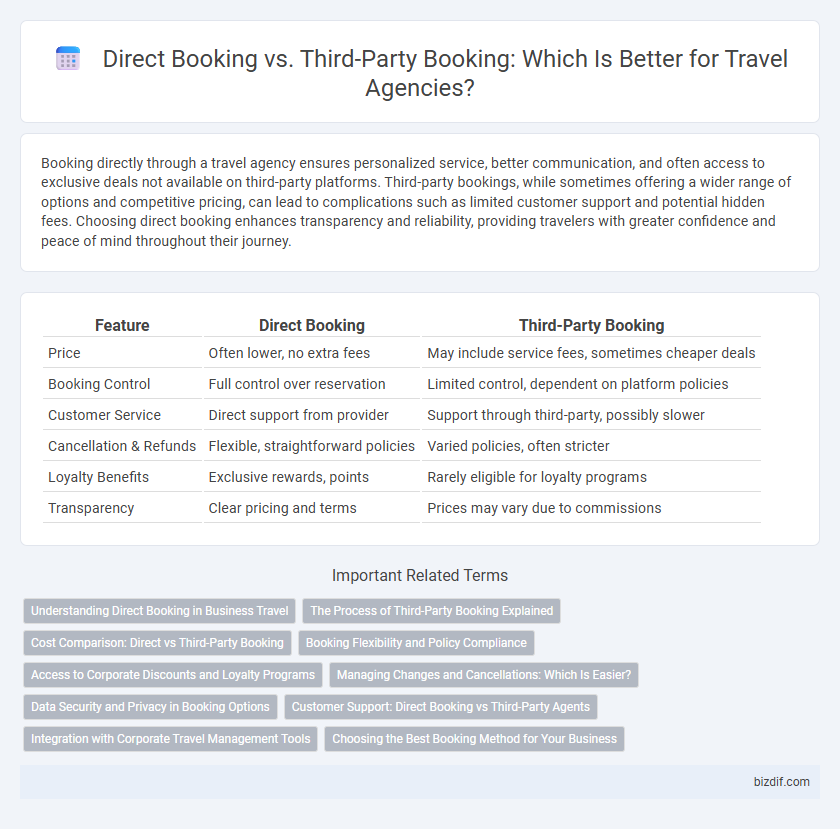Booking directly through a travel agency ensures personalized service, better communication, and often access to exclusive deals not available on third-party platforms. Third-party bookings, while sometimes offering a wider range of options and competitive pricing, can lead to complications such as limited customer support and potential hidden fees. Choosing direct booking enhances transparency and reliability, providing travelers with greater confidence and peace of mind throughout their journey.
Table of Comparison
| Feature | Direct Booking | Third-Party Booking |
|---|---|---|
| Price | Often lower, no extra fees | May include service fees, sometimes cheaper deals |
| Booking Control | Full control over reservation | Limited control, dependent on platform policies |
| Customer Service | Direct support from provider | Support through third-party, possibly slower |
| Cancellation & Refunds | Flexible, straightforward policies | Varied policies, often stricter |
| Loyalty Benefits | Exclusive rewards, points | Rarely eligible for loyalty programs |
| Transparency | Clear pricing and terms | Prices may vary due to commissions |
Understanding Direct Booking in Business Travel
Direct booking in business travel enables companies to secure flights, hotels, and car rentals directly from providers, ensuring better control over expenses and personalized service options. This approach often results in cost savings, loyalty benefits, and streamlined communication, reducing the risk of errors or mismanagement common with third-party platforms. Companies leveraging direct booking access customized corporate rates and detailed travel data, enhancing overall travel policy compliance and reporting accuracy.
The Process of Third-Party Booking Explained
Third-party booking involves using online travel agencies (OTAs) such as Expedia, Booking.com, or Agoda to reserve flights, hotels, or car rentals. These platforms aggregate options from multiple providers, allowing travelers to compare prices and reviews in one place before making a reservation. While convenient, third-party bookings may include additional fees and limited direct communication with service providers, impacting customer support and flexibility.
Cost Comparison: Direct vs Third-Party Booking
Direct booking with a travel agency often results in lower overall costs due to the elimination of third-party service fees and access to exclusive discounts. Third-party booking platforms may offer competitive initial prices but frequently include hidden charges and fewer flexible cancellation policies, increasing the total expense. Travelers benefit from direct communication and personalized offers when booking directly, which can lead to better cost savings and added value.
Booking Flexibility and Policy Compliance
Direct booking through a travel agency offers greater booking flexibility, allowing travelers to modify or cancel reservations with fewer restrictions and often without additional fees. Third-party booking platforms may impose stricter policy compliance, including limited changes and non-refundable conditions that can hinder adjustment options. Ensuring policy alignment with travel needs is essential when choosing between direct and third-party booking methods for a seamless travel experience.
Access to Corporate Discounts and Loyalty Programs
Direct booking with a travel agency provides exclusive access to corporate discounts and loyalty programs not always available through third-party platforms. Companies often negotiate special rates and perks with travel providers that are only accessible via direct channels, ensuring better savings and rewards accumulation. Loyalty programs also tend to offer enhanced benefits, such as priority upgrades and bonus points, when bookings are made directly through the agency.
Managing Changes and Cancellations: Which Is Easier?
Direct booking offers greater flexibility in managing changes and cancellations, often providing clearer refund policies and faster customer support since you interact directly with the travel provider. Third-party bookings may involve stricter rules, additional fees, and a more complex process due to the involvement of intermediaries, which can delay responses and refunds. Travel agencies recommend direct booking for travelers seeking hassle-free adjustments and straightforward cancellation procedures.
Data Security and Privacy in Booking Options
Direct booking with a travel agency ensures enhanced data security and privacy by keeping personal and payment information within a controlled system, minimizing exposure to third-party breaches. Third-party booking platforms often require sharing sensitive data across multiple vendors, increasing the risk of unauthorized access and data leaks. Prioritizing direct bookings helps travelers maintain greater control over their private information and reduces vulnerability to cyber threats.
Customer Support: Direct Booking vs Third-Party Agents
Direct booking with a travel agency often provides superior customer support, as agents have direct access to reservations and can quickly address issues or changes. Third-party agents may offer competitive prices but frequently lack real-time access to booking details, leading to slower response times and limited assistance. For travelers prioritizing efficient and personalized support, direct booking ensures streamlined communication and faster resolution of any travel-related concerns.
Integration with Corporate Travel Management Tools
Direct booking offers seamless integration with corporate travel management tools, enabling automated expense reporting, real-time itinerary updates, and enhanced compliance tracking. Third-party booking platforms may lack full compatibility with enterprise systems, potentially causing data silos and manual reconciliation. Choosing direct booking channels optimizes workflow efficiency and strengthens data accuracy for corporate travel programs.
Choosing the Best Booking Method for Your Business
Direct booking offers travel agencies higher profit margins and greater control over customer experience by eliminating intermediary fees and fostering direct client relationships. Third-party booking platforms provide extensive reach and convenience, enabling agencies to access a broader audience and leverage established review systems to build trust. Selecting the best booking method depends on balancing cost efficiency, customer engagement, and market exposure tailored to specific business goals.
Direct booking vs Third-party booking Infographic

 bizdif.com
bizdif.com